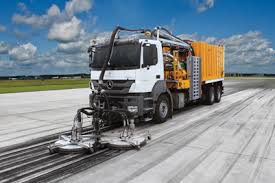When a plane lands, the tires are not spinning. The time it takes for the tires to get up to speed is referred to as “spin-up time”. During this time the tires are effectively dragging on the runway and being put under pressure by the aeroplane’s weight. This can be seen in the slight puff of smoke from a landing aircraft’s tires as they first touch the runway surface. The friction built up causes the rubber to polymerise and harden to the runway surface.
The build-up of rubber affects the runway’s friction, most noticeably as a reduction in braking and ground handling performance. This can lead to incidents such as runway overrun or a lateral slide off the runway.
Airfield rubber removal, also known as runway rubber removal, uses high-pressure water, abrasive, chemicals and/or other mechanical means to remove the rubber from tires that builds up on airport runways. In the United States, the Federal Aviation Administration (FAA) specifies friction levels for the safe operation of planes and measures friction coefficients to evaluate appropriate friction levels. Individual airports incorporate rubber removal into their maintenance schedules based on the number of taking offs and landings that each airport experiences.

